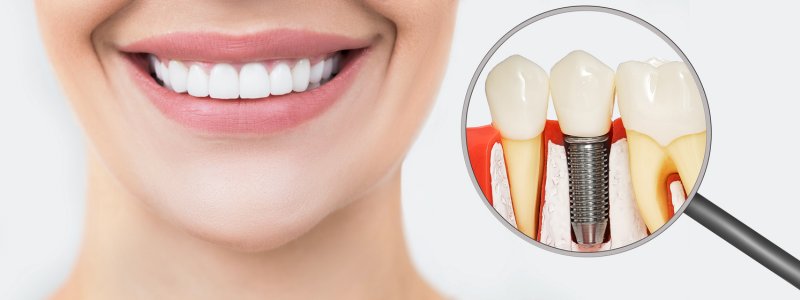
Although dental implants are made of durable, long-lasting acrylic resins that look like natural teeth and gums, they still require continuous maintenance that involves at-home care and professional care provided at our dental clinic.
In this blog, we’ll look at the following:
- What you need to know to maintain a full dental implant
- Is there a schedule needed to maintain dental implants?
- What causes constant maintenance for a full dental implant?
- Can you use a Waterpik on dental implants?
- Is mouthwash good for Implants?
- What kind of tools are used for a professional dental implant cleaning?
- What are the signs of a dental implant infection?
What You Need to Know to Maintain a Full Dental Implant
When maintaining a full dental implant, keeping an at-home routine while visiting your dentist regularly is crucial.
Brush and Floss
Caring for implants is essentially the same as caring for natural teeth. You’ll want to brush your teeth twice daily or after each meal and floss once a day. Use gentle, non-abrasive toothpaste and a soft-bristled toothbrush to avoid scratching the surface of your implants.
Watch What You Eat
Your dental implant is permanent, so whatever you eat or drink will come in contact with it. Try to keep to a healthy, balanced diet with limited sugar. Likewise, certain foods may be too hard or sticky for your implants, putting them at risk of damage. Try to avoid the following foods after dental implants:
- Hard candies
- Apples
- Carrots
- Steak
- Caramel
- Ice
- Dried Fruit
- Popcorn
- Nuts
Directly after the procedure, make sure you follow your dentist’s post-care instructions, which typically include cleaning techniques and sticking to soft foods for a couple of weeks. Alcohol and smoking can also harm your implants during the healing process, leading to complications.
Is There a Schedule Needed to Maintain Dental Implants?

Follow the same schedule you would when caring for your teeth in general. Visit your dentist every six months for a check-up and general maintenance. Depending on your oral health history, your dentist may need to see you every three months for implant maintenance, specifically if you have a history of gum disease. Overall, dental implants are low-maintenance and don’t require much more than natural teeth to keep them clean and healthy.
What Causes Constant Maintenance for a Full Dental Implant?
Dental implants are custom-made to fit your mouth using supporting structures, which can cause inflammation and bone loss due to plaque build-up. Just like natural teeth, your implants must be cared for and cleaned. Otherwise, plaque accumulation can lead to pain, bleeding, and the onset of gum disease.
Can You Use a Waterpik on Dental Implants?
Not only is it safe to use a Waterpik on dental implants, but it’s also preferred over regular flossing. Tufts University found that the Waterpik® Water Flosser is more than 2X as effective for cleaning around dental implants. It’s also excellent for cleaning between teeth with braces, implants, and bridges. Using a Waterpik as a part of your daily oral hygiene routine can decrease the risk of plaque build-up and gum disease. Similarly, an electric toothbrush or interdental brush can benefit your dental implant care routine so long as it has soft bristles.
Is Mouthwash Good for Implants?
Yes, you can use mouthwash to clean your dental implants. Your dental hygiene routine for implants is the same as your natural teeth, so brushing and flossing, along with mouthwash, all contribute to a healthy smile. It’s best to go with a non-alcoholic mouthwash or mouth rinse to avoid irritating your gums, especially soon after your procedure.
What Kind of Tools Are Used for a Professional Dental Implant Cleaning?
To avoid damaging your dental implant’s abutment and crown during in-office maintenance of dental implants, we use special dental tools called curettes and scalers, which are made from materials that cannot scratch implants. While we use metal instruments to clean your real teeth, dental implant cleaning tools are constructed of resins or plastic compounds that safely remove biofilm without damaging your dental implant.
What Are the Signs of a Dental Implant Infection?
If you can see the root replacement part (implant body), this may indicate an ongoing infection has caused gum loss or possibly bone loss. Implant surfaces become exposed when fusion of the implant to the bone is compromised by infection, normally due to lack of proper dental implant cleaning.
Specialized dental brushes can remove biofilm of an implant’s exposed areas. If dental adhesive is found on the implant surface, we’ll also need to completely clean the surface before repairing the dental implant.
Although dental implants present a few cleaning challenges, they are highly successful as alternatives to bridges or dentures. With excellent care, you can expect your dental implant to last 20 years or more.

Published on: December 28, 2015
Updated on: November 7, 2023
